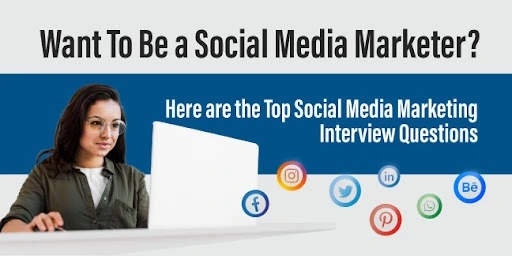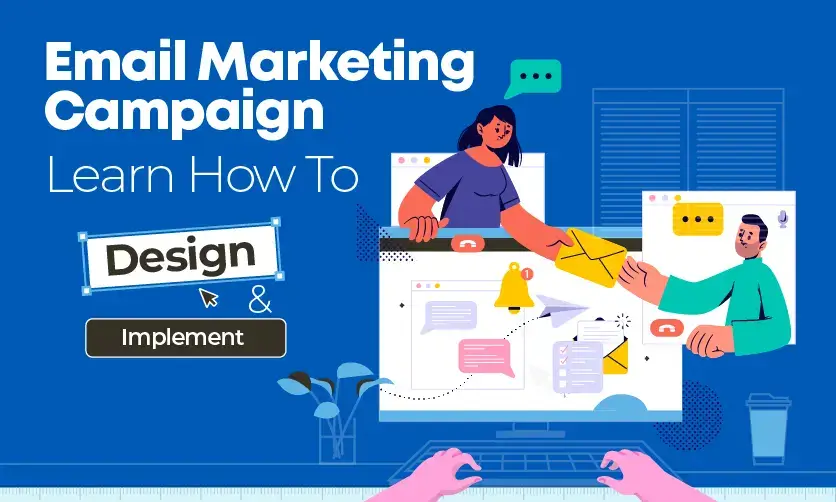
Top Social Media Marketing Interview Questions
Starting a career as a social media marketer can be exciting but challenging. Our blog post, “Social Media Marketing Interview Questions,” provides the key questions and answers you need to prepare to impress employers. Whether you’re just starting or looking to advance in your career, knowing these questions will help you stand out in your interviews.
This blog will help you understand what employers are looking for. We’ll cover everything from your knowledge of social media platforms to your ability to analyze data and create engaging content. By preparing for these questions, you’ll be ready to showcase your skills and land the social media marketing job you want.
Table of Contents
Social Media Marketing Interview Questions and Answers For Freshers:
What is social media marketing?
Social media marketing uses social media platforms to connect with an audience to build a brand, increase sales, and drive website traffic. This involves publishing content on social media profiles, engaging with followers, analyzing results, and running social media advertisements.
What are the pillars of social media marketing?
The pillars of social media marketing are:
- Content Creation:Crafting valuable, relevant, and consistent content that resonates with the target audience.
- Community Engagement: Building relationships with followers by interacting with them, responding to comments, and fostering a sense of community.
- Analytics and Measurement:Tracking key metrics to understand performance, refine strategies, and demonstrate ROI.
- Advertising:Utilizing paid social media ads to reach a broader audience and achieve specific marketing goals.
- Strategy Development:Creating a complete plan that aligns with business objectives, defines goals, and outlines for different platforms.
- Platform Management:Managing the day-to-day activities on social media platforms, including posting, monitoring, and engaging with the audience.
Grow Your Digital Marketing SkillsLearn Practical with Expert Instructors |
|
| Facebook Ads Certification | |
| More Learning Options for you: Diploma Course | Advanced Diploma in Digital Marketing | Certification Course |
Which social media platforms are you most familiar with?
I am most familiar with Facebook, Instagram, Twitter, and LinkedIn. I can create content, interact with audiences, and run ad campaigns on these platforms.
How do you stay updated with the latest social media trends?
I follow industry blogs, attend webinars, go to conferences, and follow social media experts. I also use tools like Feedly to keep up with news from multiple sources.
What is the impact of social media on your business?
- Brand Awareness:It helps increase the visibility and recognition of our brand. Regular posts, engaging content, and interactions with followers make more people aware of our business.
- Customer Engagement:Social media allows us to interact directly with customers, answering their questions, addressing their concerns, and building relationships. This engagement fosters customer loyalty and trust.
- Lead Generation and Sales:By sharing valuable content and running targeted ad campaigns, we can attract potential customers and drive traffic to our website, leading to increased sales and revenue.
- Market Insights:Social media provides valuable insights into customer preferences, behaviors, and trends through analytics and direct feedback. This data helps us make informed business decisions and tailor our offerings to meet customer needs.
- Cost-Effective Marketing:Compared to traditional advertising, social media marketing is more affordable and allows for precise targeting, ensuring that our marketing efforts reach the right audience.
- Competitor Analysis: Monitoring competitors on social media helps us stay informed about their strategies, strengths, and weaknesses, allowing us to adapt and stay competitive.
- Customer Support: Social media serves as an additional channel for customer support, enabling us to resolve issues quickly and publicly demonstrate our commitment to customer satisfaction.
What are the key metrics you track for social media performance?
Key metrics include engagement rate (likes, comments, shares), reach, impressions, follower growth, click-through rate (CTR), and conversion rate.
How do you handle negative comments or feedback on social media?
I respond quickly and professionally, acknowledge the issue, apologize if necessary, and offer a solution or direct the user to customer support to show that we value their feedback.

What tools do you use for social media management?
I use tools like Hootsuite, Buffer, and Sprout Social to schedule posts. For analytics, I use platform insights and Google Analytics. I use Canva and Adobe Spark to create visuals.
How do you determine the right social media platform for a brand?
I consider the target audience, the type of content the brand produces, and the strategy goals. I research where the audience is most active and tailor the approach accordingly.
Can you explain the importance of having a content calendar?
A content calendar helps plan and organize posts in advance, ensuring consistent and timely content delivery, and aligning with marketing campaigns.

What is the difference between organic and paid social media?
| Subject | Organic Social Media | Paid Social Media |
| Definition | Organic social media involves free content shared directly on social media platforms. This includes posts, stories, videos, and any other type of content that users can see without any payment. | Paid social media involves paying to promote your content or advertisements on social media platforms. This can include sponsored posts, display ads, video ads, and more. |
| Reach | The reach of organic content is limited to your followers and their networks if they engage with your content. The algorithms of social media platforms also affect how widely your content is seen. | Paid content can reach a much broader audience beyond your followers, as it is targeted based on demographics, interests, behaviors, and other criteria set during the ad campaign. |
| Engagement | Engagement comes naturally through likes, comments, shares, and follows. Building a strong organic presence requires consistent posting, valuable content, and active interaction with followers. | Engagement is often driven by the visibility purchased through the platform. Paid campaigns can be optimized for specific objectives like clicks, conversions, video views, or engagement. |
What are some common social media marketing mistakes to avoid?
Common mistakes include not having a clear strategy, inconsistent posting, ignoring audience engagement, not tracking performance, and using irrelevant or excessive hashtags.
How to define the target audience for social media campaigns?
Define the target audience based on demographics, interests, behaviors, and location, using insights from previous campaigns, customer data, and platform analytics.

What is user-generated content, and why is it important?
User-generated content (UGC) is content created by customers, like reviews, photos, or videos. It builds trust and authenticity since people trust other users more than brands
How do you integrate social media marketing with other marketing channels?
I align social media efforts with overall marketing campaigns, cross-promote content across email and blogs, and use consistent messaging for a cohesive brand experience.
Social Media Manager Interview Questions
What is the significance of engagement rate, and how do you calculate it?
Engagement rate measures how actively the audience interacts with content. It’s calculated by dividing total engagement (likes, comments, shares) by total reach or followers, then multiplying by 100.
How do you handle multiple social media accounts for a brand?
I use management tools to schedule posts, monitor engagement, and track performance across accounts, ensuring each has a tailored strategy while maintaining brand consistency.
What is your experience with social media customer service?
I handle customer inquiries, complaints, and feedback on social media, ensuring timely and helpful responses, escalating issues when needed, and using insights to improve services.
Can you describe a time when a social media campaign didn’t go as planned? How did you handle it?A campaign once didn’t get the expected engagement. I analyzed the data, gathered feedback, adjusted the strategy, and communicated with the team to learn from the experience.
What is your experience with video content for social media?
I create and edit video content for platforms like Instagram, Facebook, and YouTube, focusing on engaging and visually appealing videos that capture attention.
How do you approach influencer marketing?
I identify influencers who align with our brand and audience, reach out with a clear proposal, collaborate on content creation, and track the campaign’s results.
Can you give an example of a time you used data to improve a social media strategy?
I noticed our Instagram engagement was dropping. After analyzing data, I found posts with user-generated content had higher engagement. I adjusted our strategy to include more of this content, increasing engagement by 15%.
What is the role of SEO in social media marketing?
SEO helps in improving the visibility of social media profiles and content in search engines. I use relevant keywords in bios, captions, and posts, and optimize content for search to increase discoverability.
What is A/B testing, and how do you use it in social media marketing?
A/B testing involves creating two versions of a post or ad to see which performs better. I use it to test different headlines, image calls to action, or posting times to optimize content and improve performance.

What are some ways to boost engagement on social media posts?
To boost engagement, I ask questions, create polls, run contests, use interactive content like quizzes, and respond to comments. Posting at optimal times and using eye-catching visuals also helps.
How do you measure ROI in social media marketing?
ROI is measured by comparing the investment in social media (time, money, resources) with the returns, such as increased sales, lead generation, website traffic, or brand awareness. Tools like Google Analytics and social media insights help track these metrics.
How do you track the success of a social media campaign?
I set specific, measurable goals before the campaign and use analytics tools to track key metrics like engagement, reach, conversions, and ROI. I compare these metrics against the goals to evaluate success.
How do you approach social media marketing for B2B versus B2C?
For B2B, I focus on LinkedIn and Twitter, sharing industry insights, case studies, and professional content. For B2C, I use platforms like Instagram, and Facebook focusing on engaging, entertaining, and visually appealing content.
What is the importance of a social media audit?
A social media audit evaluates the performance of all social media accounts, identifies what’s working and what’s not, and helps in refining strategies to achieve better results.
What is social listening, and why is it important?
Social listening involves monitoring social media platforms for mentions of your brand, competitors, and industry trends. It helps in understanding audience sentiment, identifying opportunities, and addressing issues promptly.
Grow Your Digital Marketing SkillsLearn Practical with Expert Instructors |
|
| Facebook Ads Certification | |
| More Learning Options for you: Diploma Course | Advanced Diploma in Digital Marketing | Certification Course |
Conclusion:
This blog will help you understand what employers are looking for. We cover everything from your knowledge of social media platforms to your ability to analyze data and create engaging content. By preparing for these questions, you’ll be ready to showcase your skills and land the social media marketing job you want.
Remember, the job market for social media marketing is competitive, but with thorough preparation and a clear understanding of the essential concepts, you can make a strong impression. Study these questions and answers, practice your responses, and go into your interview with confidence. With the right preparation, you’ll be well on your way to securing your dream job as a social media marketer. Good luck!
- SEO Trends in 2025: The Future of Search Engine Optimization - February 26, 2025
- How to Make Personal Branding: Top 9 Platforms with Process - February 12, 2025
- Zomato Marketing Strategy- A Detailed Case Study - February 5, 2025


